- Home
- Michael Bond
Monsieur Pamplemousse on the Spot Page 5
Monsieur Pamplemousse on the Spot Read online
Page 5
Pommes Frites had lost no time in getting down to serious work. The niceties of menu-planning went by the board, the ambience of his surroundings passed unnoticed. Rules for following fish by meat rather than vice versa were disregarded. There was no dilly-dallying between courses. International preferences concerning the priority of cheese over sweet were solved by the simple expedient of eating both together. Coffee was taken ad hoc.
Alphabetically, but otherwise in no particular order, he consumed in a remarkably short space of time: Andouillette; Boeuf prepared in a variety of ways; Boudins, black and white; Caviar (white, from the roe of the albino sturgeon); Coq au Vin and Coquilles St. Jacques followed by Crêpes Suzettes. D’Agneau sur le grill rapidly became d’Agneau dans le Pommes Frites, along with Ecrevisse; Estouffade (cooked in the local manner with red wine, bacon and mushrooms); Foie gras; Fraises; Fromages too numerous to list; Glaces in profusion; Gratinées; Homard – both lukewarm and cold; Ile flottante; Jambon; Journaux; Knackwurst (ordered in advance by a guest from Alsace who was celebrating his birthday not wisely but too well); Lapereau; Loup en croûte; Mousse au chocolat; Noisette de Chevreuil served with morilles; Oeufs from many different sources; Omble; Pâté; Pâtisseries; pieces of plastic; Pigeonneau; Pommes; Poulet; Quenelles Nantua; Queues d’écrevisses; Ris de veau; Rouget; Salade which had once been green but was now a greyish brown; Sorbets in a panaché to end all panachés; Truffes; Truite; Ursuline; Vacherin; Veau Waffelpasteta (another indulgence of the guest from Alsace, most of which he’d left for fear of not living to celebrate another birthday); Xavier soup; Yaourt and Zébrine.
He was now suffering the after-effects of this gargantuan meal; a meal which would have caused even the great Escoffier, accustomed as he must have been to preparing vast banquets for Kings and Queens and Princes the world over, to turn in his grave and reach for the indigestion tablets.
Presented with a break-down of the contents of Pommes Frites’ stomach, no self-respecting vet would have given overmuch for his chances of surviving the night, let alone of making an early recovery; a medical opinion with which the patient would have wholeheartedly concurred.
Pommes Frites couldn’t remember ever having felt quite so full before, or so under par. And it was at that moment in time that Monsieur Pamplemousse, concerned by the expression of unrelieved woe on his friend’s face, unwittingly administered the unkindest cut of all. Feeling inside his jacket pocket, he produced what in normal circumstances would have been the panacea for all ills, and held the object to Pommes Frites’ nose.
The effect was as devastating and immediate as had been his attempt a few moments earlier to administer the kiss of life.
Pommes Frites stared at the bone-shaped biscuit as if he could hardly believe his eyes and then, having lifted up his head and given voice to a howl which was, if possible, even more desolate than the first, tottered round in a barely completed half-circle, gazed up at his master with a look of mute despair, and then collapsed in an untidy heap on the journal at his feet.
Unaware of the cause of this strange behaviour, Monsieur Pamplemousse sprang into action. Clearly he couldn’t leave Pommes Frites where he was. Equally clearly, Pommes Frites was in no condition to do anything about the matter himself, even if he’d wanted to.
He looked round desperately but unavailingly for help. Room service at Les Cinq Parfaits was impeccable. Pool service could not be faulted. Call for a Kir Royale and it was on the table by your side, ice-cold and with an assortment of nuts and other goodies, before you had time to call for the sunshade to be adjusted. He had a feeling though that wood service, in particular the discreet removal of a large Bloodhound to a place of comfort, might be stretching things a little too far. Bell-pushes for summoning aid were conspicuous by their absence from nearby trees.
It was then that he remembered the wheelbarrow. He’d seen it soon after his visit to Jean-Claude’s room. Large, pneumatically tyred, propped against a wall alongside a bale of hay; it would be ideal.
Fetching it took only a minute or two; getting Pommes Frites inside a great deal longer. Pommes Frites was not in one of his most co-operative moods. In fact, quite the reverse. A disinterested spectator, one with no particular axe to grind, could have been forgiven had he or she jumped to the conclusion that Pommes Frites was positively against the whole operation. Not that he showed any active sign of resistance. It was simply that he did nothing to help. Even the vast amount he had eaten that evening didn’t account for the fact that he suddenly felt twice his usual fifty kilograms. Limbs which normally propelled him with ease about his daily rounds became weak and useless, unable to support his weight. His head, normally erect and with a certain nobility about it, lolled from side to side, eyes rolling in their sockets, tongue hanging loose, as if he was suffering from some dreadful and incurable mental affliction.
Three times Monsieur Pamplemousse nearly succeeded in his task, and three times when he tried to turn the barrow upright Pommes Frites rolled out the other side, landing heavily on the ground with his paws in the air.
Fourth time lucky, conscious that sartorially speaking he was far from looking his best, Monsieur Pamplemousse set off at long last on the journey back to his room. As he turned a corner leading to the final stretch he heard voices and paused. Doubling back on himself he tried another route which took him past the dining-room again. Adopting a shambling, crab-like movement so that he could keep his back towards the windows, he swallowed his pride and touched the brim of his hat in a suitable servile acknowledgement of the interest his activities were arousing on the other side of the glass before hurrying past as fast as his load would permit.
Reaching the door to his room he uncovered yet another deficiency of Les Cinq Parfaits. In Le Guide, alongside an impressive list of symbols showing the various facilities which ranged from pool-side telephones to coin-operated vibro-mattresses (on request), was one which denoted easy access for those who had the misfortune to be confined to a wheelchair. After struggling for several minutes to enter his room, Monsieur Pamplemousse came to the conclusion that any further projects designed to attract canine customers who wished to arrive in a wheelbarrow would have to remain in the pending tray for a while. Structural alterations of a major kind would be needed; doorways would have to be widened, L-shaped corridors straightened out.
His mission completed, Pommes Frites finally and safely parked in the middle of the room, Monsieur Pamplemousse collapsed on to his bed and lay where he’d fallen for some minutes while he contemplated the air-conditioning inlet above his head. At length, duty calling, he reached for the local telephone directory.
There were three vétérinaires listed. The first failed to answer. The second announced by means of a recorded message that he was on holiday. The third call produced in the fullness of time the sleepy voice of someone who didn’t sound best pleased at being woken.
Monsieur Pamplemousse looked at his watch. He had totally lost all track of time. The hands showed a little after eleven o’clock.
He listened as patiently as possible while he was given a run-down of the other’s problems, followed by a list of priorities in which attending to ailing and unregistered dogs after six o’clock in the evening appeared to enjoy low priority against ministering to any local cows who happened to have acquired inflammation of the udders.
‘Monsieur,’ he said at last. ‘I do know about the vaches d’abondance. I realise their importance to the local economy. I know that they are gentle, brown and white creatures who enrich our lives immeasurably. I have heard the sound of the bells they wear around their necks. They have often kept me awake at night when I have been staying in the mountains. I know that without them France, indeed the whole world, would be deprived of some of its finest cheeses; the Gruyères of Comté and Beaufort, Emmental, the Tommes de Savoie, Reblochon …
‘No, Monsieur, it will not be possible to bring him in tomorrow morning.’ He glanced across the room at Pommes Frites. He hadn’t moved. ‘From the loo
k of him he will not be going anywhere for some time to come. He has the appearance of one who has eaten a large quantity of plaster of Paris. Plaster of Paris which has now set hard …
‘He is in a wheelbarrow, here in my room at Les Cinq Parfaits …
‘I realise you have had a busy day, Monsieur. I, too, have had a busy day. I rose at six o’clock this morning. I have driven all the way from Paris and I, too, am very tired. But this is a matter of great importance and the utmost urgency …’
Monsieur Pamplemousse broke off in mid-sentence. He stared disbelievingly at the receiver. It was almost beyond belief but the person at the other end had actually hung up on him.
He hesitated for a moment or two, wondering whether to try again and offer a piece of his mind, or to telephone Durelle in Paris. Durelle would be more sympathetic. He also knew about Bloodhounds in general and Pommes Frites in particular. As one-time adviser to the Sûreté (Division Chiens) he had known Pommes Frites during his early days with the force and was well used to his ways.
In the end Monsieur Pamplemousse decided against both courses of action. It was late and Pommes Frites’ breathing had become more regular. Regular and noisy. If he carried on at the present rate Les Cinq Parfaits would be liable to lose their red rocking-chair in the Michelin guide. He knew the signs. Soon the heavy breathing would turn into snores. Sleep for Monsieur Pamplemousse would become difficult, if not impossible. The way things were going he might be better off finding alternative accommodation for the night.
Several times Pommes Frites opened his mouth and licked his lips as if reliving in his dreams some recent experience of a gastronomic nature. Monsieur Pamplemousse lifted up one of his eyelids and immediately wished he hadn’t. The orb which met his gaze was bloodshot rather than hazel and totally devoid of expression. A strong smell of hay had begun to fill the room; hay and damp newsprint. It was not a pleasant combination.
Dropping Pommes Frites’ eyelid back into place, he essayed a few desultory tugs at the bedding and then gave it up as a bad job, resolving to leave matters in abeyance until the morning. At least Pommes Frites wasn’t getting worse and there was work to be done.
Heaving a deep sigh he crossed to a desk in the corner of the room and drew up a chair. Upending the envelope he had taken from Jean-Claude’s room revealed something which had escaped his notice the first time: a small cutting showing a group of skiers posing against a snow-covered mountainside. It must have been the other way up before – on the back he recognised part of a picture showing a stretch of water; it might have been anywhere. He turned the cutting over again. There were five people in the group – all male – two kneeling and three standing behind, arms akimbo. Although as a group they looked blissfully happy, he was left with a strange and irrational feeling of unease. Against the man in the middle of the back row someone had inked in a black cross and a question-mark. He held the cutting up to the light to examine it more closely. Presumably it had either been cut from a glossy magazine, or from some kind of brochure.
Putting it to one side for future reference, he turned his attention to the remaining cuttings. Something about the type-face rang a bell. In fact, he’d seen it quite recently. A loud snore from behind reminded him; a moment’s comparison confirmed his suspicions. Bits of identical newsprint were sticking to Pommes Frites. They must have come from the journal he’d been lying on in the wood.
The odd thing was that although they looked genuine enough on the surface, many of them didn’t make sense. As with the cuttings, words were misspelt, letters transposed. The whole thing was clearly a fake; it couldn’t possibly ever have been a part of something seriously offered for sale to the general public. But why? For what purpose? Who would go to all the trouble of printing a mock-up of a journal simply to cut out particular words? Presumably they were meant to be put together at some stage to form a message, but why print the words separately to start with – why not print the entire message? And if they had gone to all that trouble, why not get it right? It was all so amateurish.
His senses quickened as he felt under Pommes Frites and came across another piece of newsprint from which a single word had been cut out, part of a headline which read RUSSIAN SUBMARINE …
A quick search through the pile of cuttings on his desk revealed the missing word: DANGRE. It was neatly pasted on to a sheet of plain paper, but when he held it underneath the gap in the original it fitted exactly.
He sat down again and counted the words. There were seventeen – none were duplicated. Gazing at them he found himself reminded of the time he’d spent in England shortly after the war. In an effort to improve his English he’d become a crossword addict, revelling in the cryptic clues and the anagrams. The present problem was like an anagram, only using words instead of letters.
He set them out in no particular order, just as he had been in the habit of doing with the crossword: OF, ONE, HURRY, MESSEGE, YOUR, DANGRE, MY, NEXT, POLICE, LOVED, IS, NOT, AWAAIT, DO, IN-FORM, LIFE, IN.
Mathematically the number of possible combinations was beyond his ability to calculate. At least with a crossword one could eliminate certain letters by solving other clues, either across or down. He felt a bit like the proverbial monkey sitting at a typewriter trying to prove the theory that if it kept on typing at random for long enough it would eventually come up with the complete works of Shakespeare. That kind of time, however, was not at his disposal; according to the Director he only had until Friday at the latest.
Bringing logic to bear on the problem, he tried another approach – pairing certain words with each other in the hope of reducing the number of variations: IN-FORM with POLICE, LIFE with DANGRE, LOVED with ONE, NEXT with MESSEGE.
He added AWAAIT to NEXT MESSEGE, YOUR to LOVED and ONE.
Suddenly things began to slip into place. He had a complete sentence: AWAAIT NEXT MESSEGE OF YOUR LOVED ONE.
Returning to the first two pairings, he added MY, IS and IN, and it became IN-FORM POLICE MY LIFE IS IN DANGRE, leaving him with HURRY, DO and NOT.
Laying the words out carefully in a long line Monsieur Pamplemousse reread the complete message: IN-FORM POLICE MY LIFE IS IN DANGRE. DO NOT HURRY. AWAAIT NEXT MESSEGE OF YOUR LOVED ONE.
A sense of elation came over him. He felt a sudden need to communicate his success. What was it the Director had said? My office telephone will be manned day and night. Perhaps even now he was sitting at his desk, drumming.
Reaching for the handset, Monsieur Pamplemousse pressed the appropriate button for an outside line and was halfway through dialling when he hesitated. What had he achieved? He’d pieced together a presumably as yet unsent message, albeit in double-quick time, but it hadn’t got him any further. Repeated over the telephone it would sound like a non-event. It would trigger off a set of questions to which he had, as yet, no answers. Far better to sleep on the matter and allow his subconscious to do some of the work. Monsieur Pamplemousse was a great believer in the subconscious.
It had, in fact, already been at work. Even while he’d been dialling the office number it had sent out a message reminding him of something else the Director had said; a promise made, and one which he fully intended taking advantage of. The promise of a bottle of the d’Yquem ’45 when his mission had reached a satisfactory conclusion.
Deep down, Monsieur Pamplemousse was only too well aware that he had only really begun to scratch the surface of his problem, but scratches could widen into cuts, cuts into fissures, fissures into crevasses. There was no question of failure. Failure was not a word in his vocabulary; consequently it never entered his mind.
The evening had not been entirely without success. He now had things to work on. It was a cause for celebration. As a digestif and an aid to peaceful sleep while his subconscious got to work, he could think of nothing better than a glass or two of Sauternes.
He reached for the telephone again and pressed the button marked ‘Room Service’. It was more than likely that Les Cinq Parfaits, for all the riches which graced
the pages of its wine-list, riches which reached back to long before he was born, would be unable to meet his request. It was asking a lot, but it was worth a try.
‘Monsieur is fortunate. We have only three bottles left. When they are gone we shall be reduced to the ’62s.’
‘Bring me two,’ said Monsieur Pamplemousse in a sudden mood of recklessness. He would have one to be going on with and keep one for later, depending on the final outcome. It would help make up for a spoilt holiday and the absence of the Soufflé Surprise he’d been so looking forward to.
If the man was surprised there was no sign of it in his voice. It might have been the kind of order he received every night of his life. If there was any emotion at all it was one of respect; respect mingled with the faintest hint of regret.
‘Perhaps,’ said Monsieur Pamplemousse, ‘you would care to share a glass with me as a nightcap – a little boisson prise avant de se coucher?’
‘It would be an honour, Monsieur.’ He knew from the tone of the man’s voice that he had made a friend for life. Wine was a great leveller; a breaker-down of barriers.
The discreet knock on the door came sooner than expected. An assistant sommelier, still wearing his green baize apron, his badge of office – the silver tastevin – round his neck, entered the room pushing a trolley on which reposed two ice-buckets and two glasses. There was also a plate of wafer-thin biscuits. A palate cleanser.
Having circumnavigated Pommes Frites with scarcely more than a passing glance, he withdrew a bottle from one of the ice-buckets, holding it up with care for Monsieur Pamplemousse’s inspection.
Monsieur Pamplemousse assumed a suitably reverent expression, and then watched with approval while the sommelier went to work. From the painstaking way in which he removed the lead foil in one piece, pressing it out flat with obvious pleasure, he guessed the man must come from his own area. Only someone from the Auvergne would go to so much trouble over something which to most people would be relatively unimportant. It was strange how different areas produced people who gravitated towards certain jobs. Half the restaurants in Paris were owned or staffed by Auvergnese. If it was a Frenchman behind the wheel of a taxi, rather than an Asian, the chances were he would be from Savoie. He resolved that when the wine was finished he would replace the foil and add the bottle to his collection, a reminder of his time at Les Cinq Parfaits. Something else for Doucette to dust, as she would no doubt tell him.

 Paddington on Top
Paddington on Top Paddington Takes the Test
Paddington Takes the Test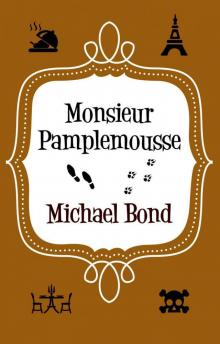 Monsieur Pamplemousse (Monsieur Pamplemousse Series)
Monsieur Pamplemousse (Monsieur Pamplemousse Series) Paddington Here and Now
Paddington Here and Now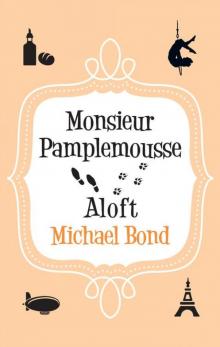 Monsieur Pamplemousse Aloft
Monsieur Pamplemousse Aloft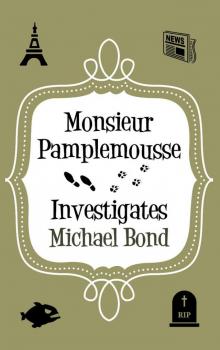 Monsieur Pamplemousse Investigates
Monsieur Pamplemousse Investigates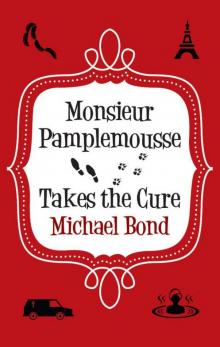 Monsieur Pamplemousse Takes the Cure
Monsieur Pamplemousse Takes the Cure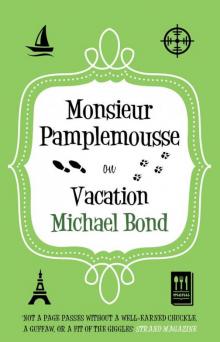 Monsieur Pamplemousse on Vacation
Monsieur Pamplemousse on Vacation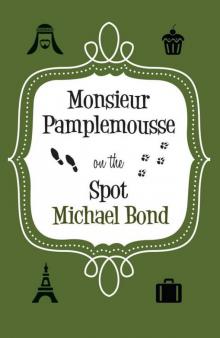 Monsieur Pamplemousse on the Spot
Monsieur Pamplemousse on the Spot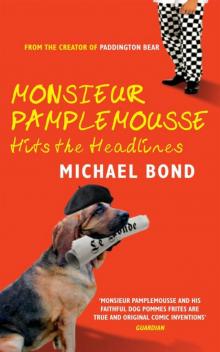 Monsieur Pamplemousse Hits the Headlines
Monsieur Pamplemousse Hits the Headlines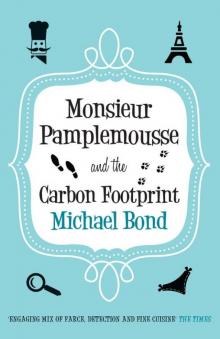 Monsieur Pamplemousse and the Carbon Footprint
Monsieur Pamplemousse and the Carbon Footprint Love from Paddington
Love from Paddington Paddington’s Finest Hour
Paddington’s Finest Hour Paddington Complete Novels
Paddington Complete Novels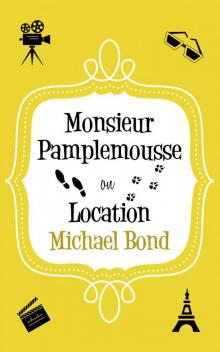 Monsieur Pamplemousse On Location
Monsieur Pamplemousse On Location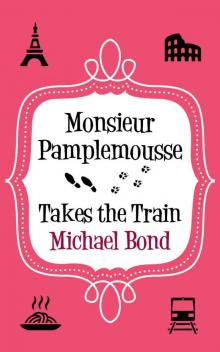 Monsieur Pamplemousse Takes the Train
Monsieur Pamplemousse Takes the Train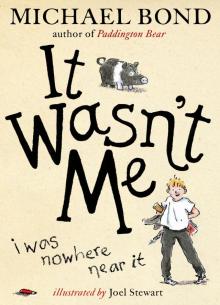 It Wasn’t Me!
It Wasn’t Me! Paddington Races Ahead
Paddington Races Ahead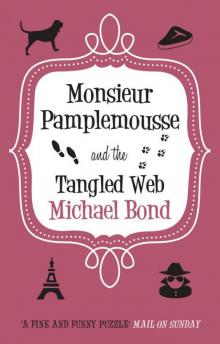 Monsieur Pamplemousse and the Tangled Web
Monsieur Pamplemousse and the Tangled Web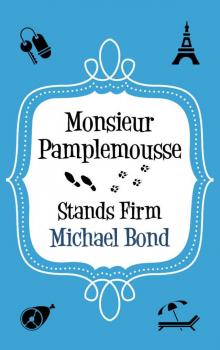 Monsieur Pamplemousse Stands Firm
Monsieur Pamplemousse Stands Firm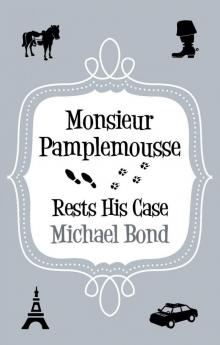 Monsieur Pamplemousse Rests His Case
Monsieur Pamplemousse Rests His Case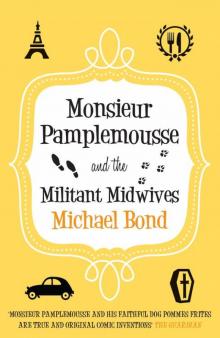 Monsieur Pamplemousse and the Militant Midwives
Monsieur Pamplemousse and the Militant Midwives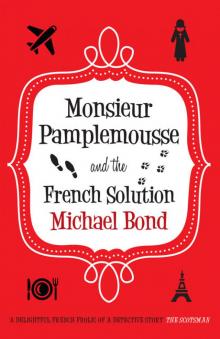 Monsieur Pamplemousse and the French Solution
Monsieur Pamplemousse and the French Solution Paddington Helps Out
Paddington Helps Out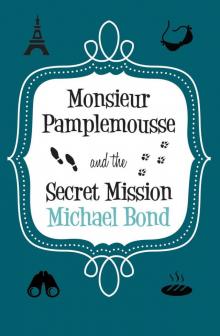 Monsieur Pamplemousse & the Secret Mission (Monsieur Pamplemousse Series)
Monsieur Pamplemousse & the Secret Mission (Monsieur Pamplemousse Series)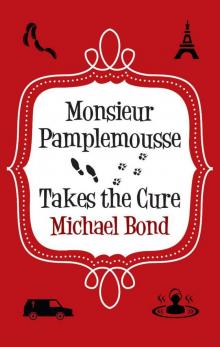 Monsieur Pamplemousse Takes the Cure (Monsieur Pamplemousse Series)
Monsieur Pamplemousse Takes the Cure (Monsieur Pamplemousse Series) A Bear Called Paddington
A Bear Called Paddington